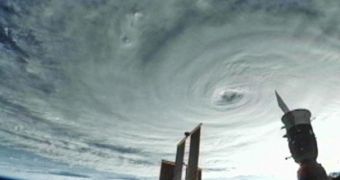The six astronauts aboard the International Space Station (ISS) have over the past two days been preparing for the departure of the Progress 38 resupply capsule, which took place yesterday.
At 15:19 Moscow Time (7:19 am EDT), experts sent the undock commands to the unmanned capsule, which undocked from the ISS three minutes later. It is currently flying autonomously.
The spacecraft is scheduled to remain in low-Earth Orbit (LEO) until September 6. It still needs to execute a series of scientific studies, including the Radar-Progress technical experiment.
After this final stage of the mission is complete, the resupply capsule will have its orbit altered, so that it reenters Earth's atmosphere. It will burn over a remote area of the Pacific Ocean, mission controllers say.
Progress 38, which launched to the ISS on June 30 from the Gagarin's Start launch pad at the Baikonur Cosmodrome, in Kazakhstan, undocked Tuesday from the aft end of the Zvezda service module.
When it arrived to orbit, it brought with it some 110 pounds of oxygen and air, 220 pounds of water, 1,918 pounds of propellant, and about 2,667 pounds of equipment, spare parts and experiment hardware for the station.
After all of these were unloaded, the six astronauts making up the Expedition 24 crew loaded the capsule with trash from the station, and then sealed it up.
This capsule will soon be replaced by the Progress 39 spacecraft, which is scheduled to launch from Baikonur on September 8, and to dock to the orbital facility some two days later.
With the American space shuttles now used primarily to transport large spare parts to the ISS, the burden of actually resupplying the ISS crew with basic necessities such as food, water and oxygen falls primarily on the shoulders of the Russian Federal Space Agency (RosCosmos).
It operates a fleet of progress capsules, which launch regularly. JAXA and ESA also contribute occasionally, but each of these two space agencies have thus far launched only one unmanned resupply capsule each.
For years to come, Russia will need to carry the burden of ensuring access to space all on its own. Only this country and China will have the capability to ferry astronauts to LEO in the coming years.
ESA, JAXA and NASA are now years away from making this a reality, and the situation is unlikely to change very soon, Space Fellowship reports.

 14 DAY TRIAL //
14 DAY TRIAL //